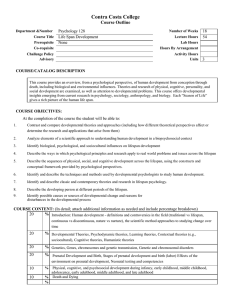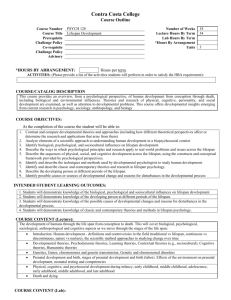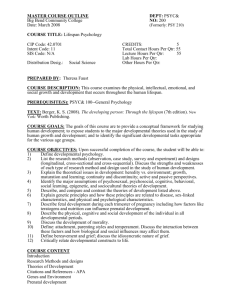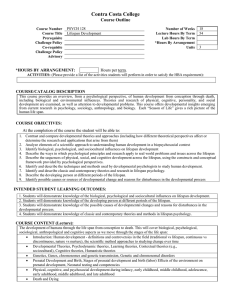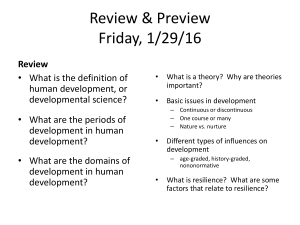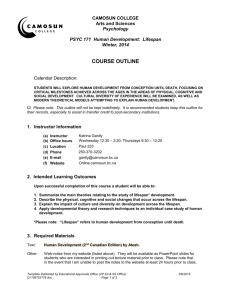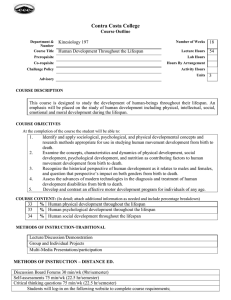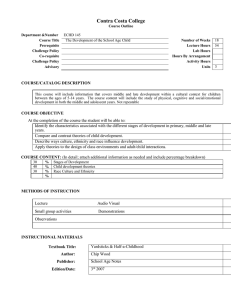PSYCH 128-S08.doc 58KB Aug 12 2014 03:58:52 PM
advertisement
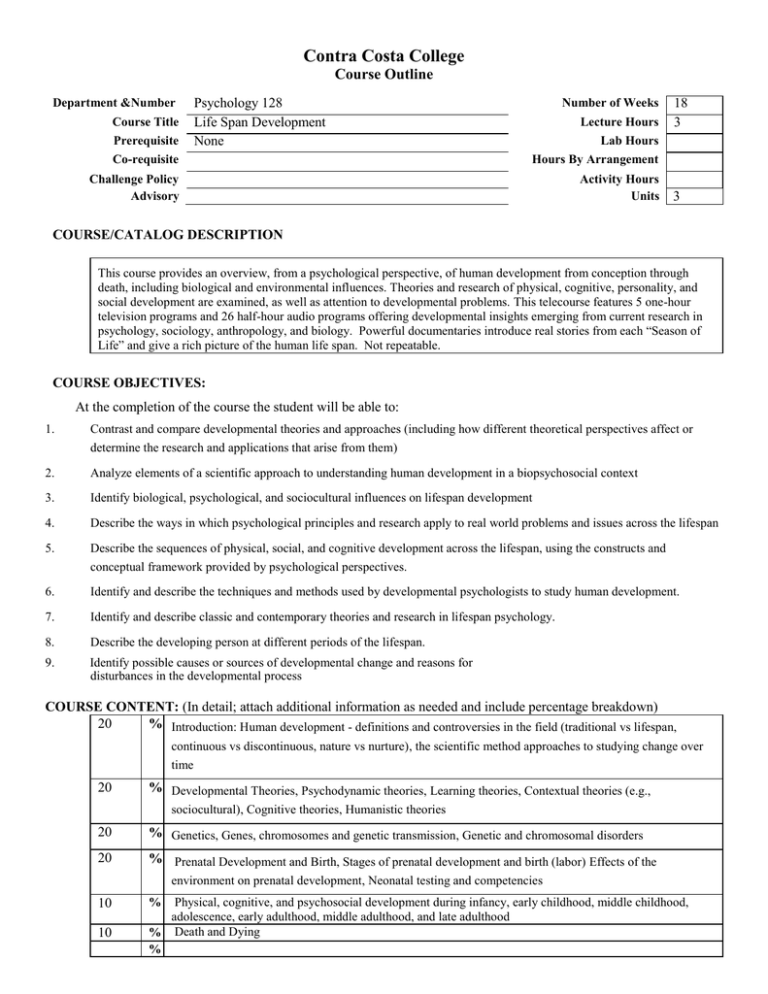
Contra Costa College Course Outline Department &Number Course Title Prerequisite Psychology 128 Life Span Development None Number of Weeks Lecture Hours Lab Hours Co-requisite Hours By Arrangement Challenge Policy Advisory Activity Hours Units 18 3 3 COURSE/CATALOG DESCRIPTION This course provides an overview, from a psychological perspective, of human development from conception through death, including biological and environmental influences. Theories and research of physical, cognitive, personality, and social development are examined, as well as attention to developmental problems. This telecourse features 5 one-hour television programs and 26 half-hour audio programs offering developmental insights emerging from current research in psychology, sociology, anthropology, and biology. Powerful documentaries introduce real stories from each “Season of Life” and give a rich picture of the human life span. Not repeatable. COURSE OBJECTIVES: At the completion of the course the student will be able to: 1. Contrast and compare developmental theories and approaches (including how different theoretical perspectives affect or determine the research and applications that arise from them) 2. Analyze elements of a scientific approach to understanding human development in a biopsychosocial context 3. Identify biological, psychological, and sociocultural influences on lifespan development 4. Describe the ways in which psychological principles and research apply to real world problems and issues across the lifespan 5. Describe the sequences of physical, social, and cognitive development across the lifespan, using the constructs and conceptual framework provided by psychological perspectives. 6. Identify and describe the techniques and methods used by developmental psychologists to study human development. 7. Identify and describe classic and contemporary theories and research in lifespan psychology. 8. Describe the developing person at different periods of the lifespan. 9. Identify possible causes or sources of developmental change and reasons for disturbances in the developmental process COURSE CONTENT: (In detail; attach additional information as needed and include percentage breakdown) 20 % Introduction: Human development - definitions and controversies in the field (traditional vs lifespan, continuous vs discontinuous, nature vs nurture), the scientific method approaches to studying change over time 20 % Developmental Theories, Psychodynamic theories, Learning theories, Contextual theories (e.g., sociocultural), Cognitive theories, Humanistic theories 20 % Genetics, Genes, chromosomes and genetic transmission, Genetic and chromosomal disorders 20 % Prenatal Development and Birth, Stages of prenatal development and birth (labor) Effects of the environment on prenatal development, Neonatal testing and competencies 10 10 Physical, cognitive, and psychosocial development during infancy, early childhood, middle childhood, adolescence, early adulthood, middle adulthood, and late adulthood % Death and Dying % % METHODS OF INSTRUCTION Lecture and Discussion (e.g., large groups and small groups). 5 one-hour television programs and 26 half-hour audio programs. INSTRUCTIONAL MATERIALS Exploring Lifespan Development Textbook Title: Berk, L.E. Author: Pearson Publisher: 3rd Edition 2011 Edition/Date: COURSE EXPECTATIONS (Use applicable expectations) Outside of Class Weekly Assignments Hours per week Weekly Reading Assignments 2 Weekly Writing Assignments 2 Weekly Math Problems Lab or Software Application Assignments Other Performance Assignments 2 STUDENT EVALUATION: (Show percentage breakdown for evaluation instruments) 66 34 % % Five Examinations Five Essays GRADING POLICY (Choose LG, CR/NC, or SC) Letter Grade 90% - 100% = A 80% - 89% = B 70% - 79% = C 60% - 69% = D Below 60% = F Prepared by: Course New/Revision Date: Course Effective Date: Revised 11/07 Credit / No Credit 70% and above = Credit Below 70% = No Credit Michel B. Arnold, MS January 2011 Spring/2008 X Student Choice 90% - 100% = A 80% - 89% = B 70% - 79% = C 60% - 69% = D Below 60% = F or 70% and above = Credit Below 70% = No Credit
